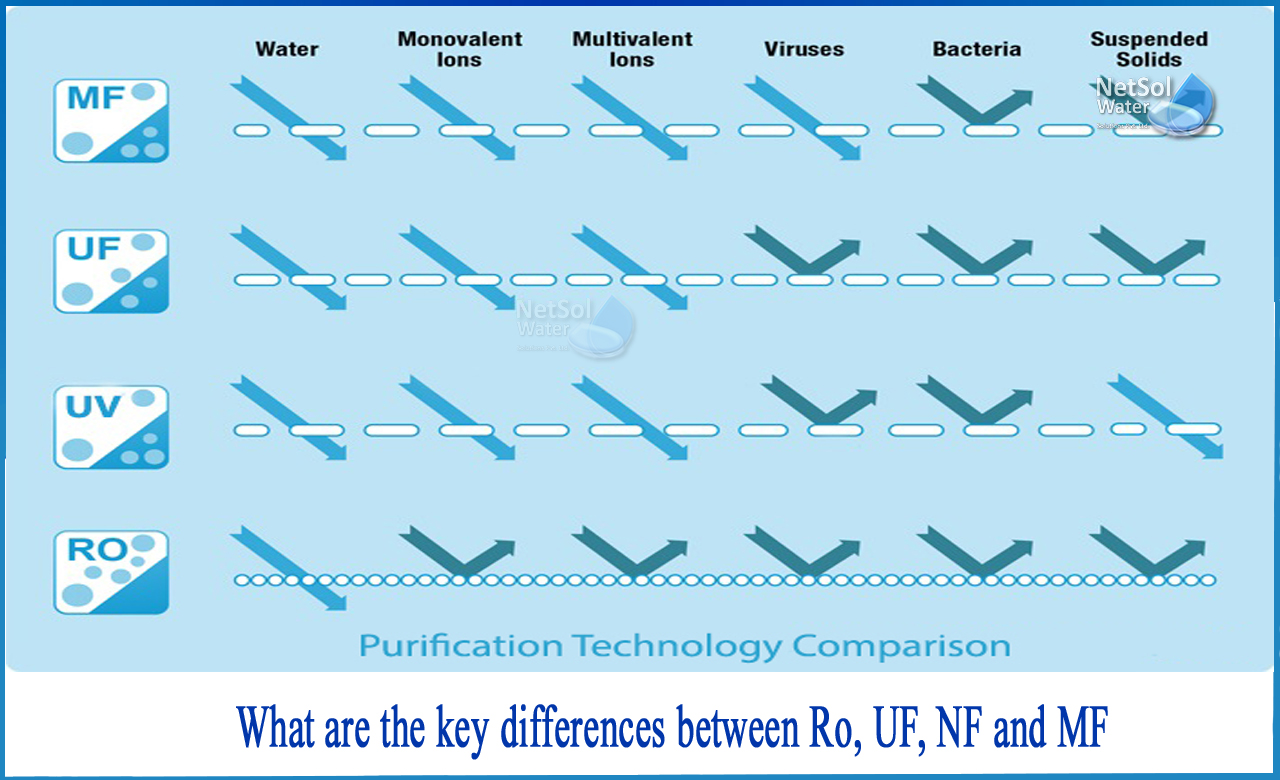What are the key differences between Ro, UF, NF and MF?
Reverse osmosis (RO)
Reverse osmosis is the highest level of filtration available. All dissolved salts and inorganic compounds, as well as organic molecules with a molecular weight larger than 100, are blocked by the RO membrane. In contrast, water molecules move freely across the membrane, resulting in a pure product stream. Dissolved salts are frequently rejected in the range of 95 to 99 percent.
Desalination of seawater or brackish water for drinking, wastewater recovery, food and beverage processing, biomedical separations, purification of household drinking water, and industrial process water are just a few of the applications of RO. It is also commonly used to produce ultrapure water for uses in the semi-conductor sector, power industry (boiler feed water), and medical/laboratory applications. The use of RO before Ion Exchange (IX) reduces the IX system's running expenses and regeneration frequency considerably.
Microfiltration (MF)
Microfiltration eliminates particles ranging from 0.1 to 1 micron in size. In general, the MF membrane rejects suspended particles and large colloids, while macromolecules and dissolved solids pass through. Bacteria, flocculated materials, and TSS are all examples of applications. Typical transmembrane pressures are 0.7 bar (10 PSI).
Ultrafiltration (UF)
Ultrafiltration separates macromolecular particles with diameters rangingupto 0.1 micron. The membrane allows all dissolved salts and smaller molecules to pass through. Colloids, proteins, microbiological pollutants, and big organic molecules are among the items rejected by the membrane. The molecular weight cut-off values for most UF membranes are between 1,000 and 100,000. Typical transmembrane pressures range from 1 to 7 bar (15 to 100 PSI).
Nanofiltration (NF)
Nanofiltration is a specialized membrane technology that filters particles with a diameter of less than one nanometre (10 Angstroms). Organic compounds with a molecular weight of 200-400 are rejected. Furthermore, dissolved salts are rejected at a rate of 20-98 percent. Monovalent anions (such as sodium chloride or calcium chloride) have rejection rates of 20-80%, but divalent anions (such as magnesium sulphate) have rejection rates of 90-98 percent.
Colour and total organic carbon (TOC) removal from surface water, elimination of hardness or radium from well water, overall reduction of total dissolved solids (TDS), and separation of organic from inorganic particles in specialty food and wastewater applications are examples of typical applications. Typical transmembrane pressures range from 3.5 to 16 bar (50 to 225 PSI).
|
RO PURIFICATION |
NF PURIFICATION |
UF PURIFICATION |
MF PURIFICATION |
|
|
|
Purification necessitates the use of electricity |
Purification necessitates the use of electricity |
Does not need electricity |
Does not need electricity |
|
|
Filters the water to remove all bacteria and viruses |
All bacteria and viruses, as well as most natural organic matter and some natural minerals, including divalent ions that generate hard water, are killed |
Filters the water to remove all bacteria and viruses |
Filters out only bacteria |
|
|
High water pressure is required. As a result, all RO systems have an additional water pump |
Works with Normal Tap Water Pressure |
Works with Normal Tap Water Pressure |
Works with Normal Tap Water Pressure |
|
|
Removes dissolved salts and harmful metals |
Cannot remove dissolved salts harmful metals |
Cannot remove dissolved salts harmful metals |
Cannot remove dissolved salts harmful metals |
|
|
Size of membrane: 0.0001 Micron |
Size of membrane: 0.01 Micron |
Size of membrane: 0.01 Micron |
Size of membrane: 0.1 Micron |
|
|
90% TDS reduction |
80-89% TDS reduction |
0% TDS reduction |
0% TDS reduction |
|
|
Wastes water but it can be reused |
Wastes a lot of water but it can be reused. |
No wastage of water |
No wastage of water |
If you want to know more about Netsol’s range of Reverse Osmosis Plants for Industrial or Commercial purposes, thenyoucan have an expert solution upon contacting Netsol Water, a leading manufacturer of Industrial and Commercial Water Treatment Plants and Wastewater Treatment Plants, among other services. Our treatment systems are very effective at removing all types of chemical, physical, and biological pollutants.
Netsol Water is Greater Noida-based leading water & wastewater treatment plant manufacturer. We are industry's most demanding company based on client review and work quality. We are known as best commercial RO plant manufacturers, industrial RO plant manufacturer, sewage treatment plant manufacturer, Water Softener Plant Manufacturers and effluent treatment plant manufacturers. Apart from this 24x7 customer support is our USP. Call on +91-9650608473, or write us at enquiry@netsolwater.com for any support, inquiry or product-purchase related query.



